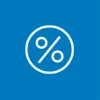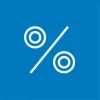Studies conducted over decades have shown that diversifying your investments across multiple asset classes (asset allocation) is a safer strategy than investing in individual asset classes.
But many funds only invest in a single asset class (European stocks, for example) and try to outperform the market by actively picking individual stocks and buying and selling these on an ongoing basis. Strategy funds are different because they invest in more than one asset class based on predetermined asset allocation schedules.
Strategy funds are widely used in asset management
Strategy funds are widely used in the asset management services and retirement saving solutions offered by banks. It is estimated that every third resident of Switzerland is invested in mutual funds to some extent. Around 80 billion Swiss francs of this wealth is invested in strategy funds.
Strategy funds – which are sometimes referred to as mixed funds – are suitable for long-term investing with an investment horizon of at least 5 years.
Broad investment in multiple asset classes
The asset allocation of strategy funds varies to meet the needs of different investors with different risk tolerance profiles. Strategy funds typically combine stock and bond investments. Some include additional asset classes like cash and other investments like real estate, hedge funds and precious metals (and other commodities).
Each strategy fund has its own bandwidth for tolerable losses in the event of downward fluctuation. Investors with higher your risk tolerance can use strategy funds with larger bandwiths. It is possible for short-term changes to be made to a strategy fund by fund managers as part of tactical asset allocation.
Defensive, balanced and aggressive funds
Strategy funds are normally divided into three very general risk categories: defensive, balance, and aggressive. The stock component is generally the determining factor which decides which category a strategy fund falls into. The larger the stock component compared to the bond component, the higher the risk associated with the fund is.
- Defensive or conservative strategy funds: Funds in this category typically invest primarily in fixed income securities like bonds. The stock components of these funds are generally small, making up between 0 and 20 percent of the fund. This means defensive funds are not very volatile and do not bear a large risk of fluctuating in value. Terms used to describe defensive strategy funds include fixed income funds, income funds, conservative funds, and yield funds. Defensive strategy funds are designed for investors with low risk tolerance or capacity.
- Balanced strategy funds: These funds generally have larger stock components than defensive funds, but still have significant fixed-income components. The stock component typically makes up between 20 and 40 percent of the fund. This makes balanced funds more volatile than defensive funds. Balanced strategy funds are suitable for investors with average risk tolerance and capacity.
- Aggressive strategy funds: These funds generally invest primarily in stocks, which makes them much more volatile than other strategy funds. Fixed-interest securities like bonds make up just a small portion of the fund. The stock component is often significantly larger than 50 percent. Terms often used for aggressive strategy funds include growth funds and dynamic funds. Aggressive strategy funds are suitable for investors with high risk tolerance and risk capacity.
Pay attention to costs and consider affordable alternatives
There are hundreds of different strategy funds available in Switzerland. These differ not only in terms of asset allocation, but also in terms of their costs. Financial experts agree that most strategy funds are overpriced, with costs eating away at returns. Comparing is key to maximizing returns and avoiding losses.
In addition to the fund’s annual total expense ratio (TER) which you pay every year, you should also consider one-time costs. Many funds have sales charges (front-end loads) which you pay when you invest in the fund. A sales charge above 1.5 percent are high.
Make sure to compare not only strategy funds, but also passive funds like index funds and exchange-traded funds (ETFs). Index funds and ETFs are typically passively managed and generally invest in just one asset class. This means you will have to combine several index funds or ETFs to achieve the same diversity you get with just one strategy fund. For example, you could divide your investment between one stock ETF and one bond ETF.
If you are investment-savvy, you can invest in index funds and ETFs yourself using a low-cost online trading platform. If you are not, you can consider affordable digital asset management services which select a portfolio of ETFs based on your risk tolerance. Both of these options can work out cheaper than many strategy funds.
More on this topic:
Compare Swiss online trading platforms now
Compare Swiss asset management services now
Compare Swiss retirement funds now







